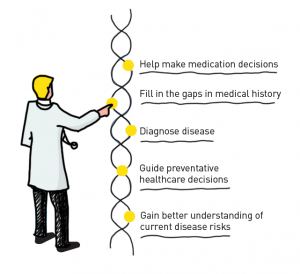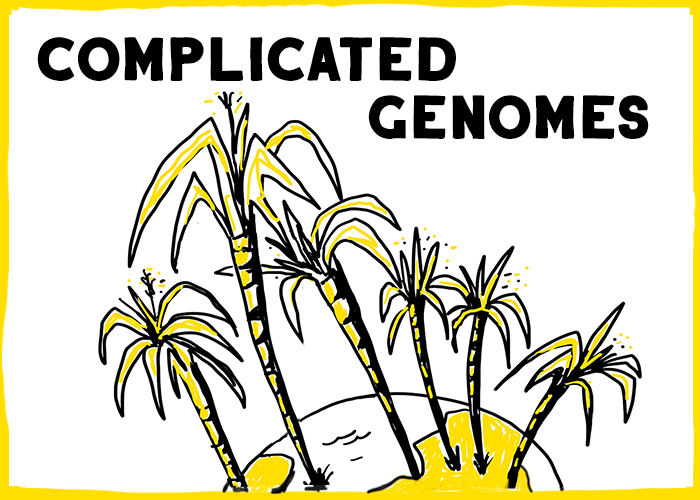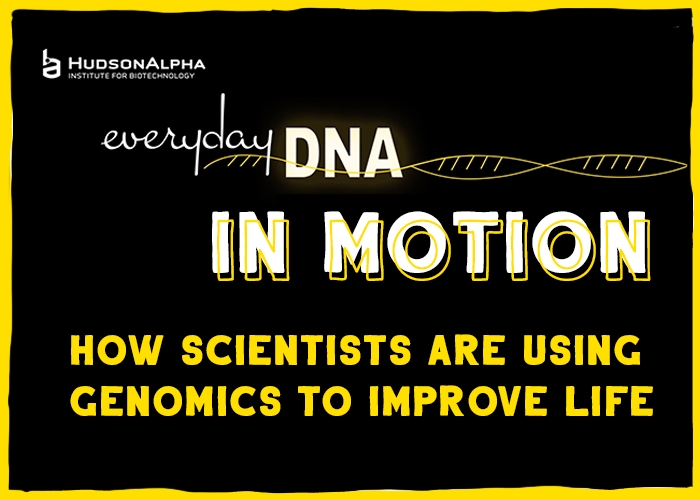An Everyday DNA blog article
by: Sarah Sharman, PhD, Science writer
 Early medical diagnoses made by humans were based on what ancient physicians could observe using only their senses. Then the microscope opened a door so that physicians and scientists could observe the cellular structure of human tissue, as well as the organisms that cause some diseases. More sophisticated tools and techniques, like the thermometer, stethoscope, and X-ray technology, emerged throughout the 16th to 19th centuries, arming physicians with a growing diagnostic toolkit to assess a person’s health.
Early medical diagnoses made by humans were based on what ancient physicians could observe using only their senses. Then the microscope opened a door so that physicians and scientists could observe the cellular structure of human tissue, as well as the organisms that cause some diseases. More sophisticated tools and techniques, like the thermometer, stethoscope, and X-ray technology, emerged throughout the 16th to 19th centuries, arming physicians with a growing diagnostic toolkit to assess a person’s health.
While all of these advances were monumental for medical diagnostics, the realization that a person’s own DNA could contribute to disease, and the subsequent discovery of how to read and scan a person’s DNA, was a true game-changer. In the beginning, genetic testing was only applied to diagnose or explain the cause of existing diseases. Now people are turning to their genomes to learn more, including their ancestry, the potential for future diseases, and drug interactions or effectiveness.
Let’s learn how your genome influences your health, and how genomic health programs can help patients and physicians alike incorporate genomic information into health care.
How does DNA play a role in health and disease?
DNA, short for deoxyribonucleic acid, is a long twisting molecule that contains the blueprint for life. The human genome is made up of nearly 4.6 billion DNA base pairs (A, T, C, and G) that hold the instructions needed for an organism to develop, survive, and reproduce. To carry out these functions, DNA sequences are converted into messages that can be used to produce proteins, which actually do most of the work in our bodies.
DNA’s instructions tell the cell’s protein-making machinery the exact order in which to link tiny chemicals called amino acids to make specific proteins. Amino acids are so important that they are referred to as the building blocks of life. Different combinations of about 20 amino acids come together like Legos to produce proteins. A typical cell contains tens of millions of proteins, all organized to help the cell carry out its necessary functions. Cells are arranged together in tissues, which make up organs. Systems of organs together make up living creatures.
 Proteins serve many different purposes in the body besides making cells. The pigment that makes your eye color is a protein and the keratin that builds your hair is also a protein. Antibodies and enzymes that perform important functions in the body are also proteins. All proteins must be formed in the correct shape, location, and amount in order for the human body to function properly. Because DNA ultimately codes for these all-important proteins, variations in DNA (whether it be mutations in the sequence of DNA or changes to DNA expression) can lead to mishaps in protein production which sometimes lead to disease.
Proteins serve many different purposes in the body besides making cells. The pigment that makes your eye color is a protein and the keratin that builds your hair is also a protein. Antibodies and enzymes that perform important functions in the body are also proteins. All proteins must be formed in the correct shape, location, and amount in order for the human body to function properly. Because DNA ultimately codes for these all-important proteins, variations in DNA (whether it be mutations in the sequence of DNA or changes to DNA expression) can lead to mishaps in protein production which sometimes lead to disease.
Researchers and physicians are constantly discovering genetic causes for diseases and disorders. There are currently more than 7,000 diseases and disorders that are caused by one or more variations in DNA. In some cases, DNA variation is inherited from one or both of your parents. In other cases, DNA acquires multiple mutations throughout a person’s life due to random chance or environmental factors like smoking and radiation.
Information from your DNA can help physicians diagnose or gain a better understanding of current or future medical problems, fill in the gaps in your medical history, and even gain a better understanding of how certain medications will work for you.
Incorporating genomic data into healthcare practice
More and more patients are able to access genetic information, whether it is from a direct-to-consumer test or a test ordered by a physician. As genomic data becomes more integrated into health care and clinical decision-making, there is a growing need for trusted experts to help guide individuals through the complexities of genomic health.
The HudsonAlpha Center for Genomic Health was formed to be a reliable resource for physicians, healthcare providers, patients, and employers looking to discover the ways genetic information can improve health outcomes and quality of life. The internationally recognized researchers, clinicians, analysts, and informaticians in the Center give medical providers the means to help develop targeted treatment and prevention plans.
The Center brings together the HudsonAlpha Health Alliance, HudsonAlpha Clinical Services Lab, The Smith Family Clinic for Genomic Medicine, and researchers from various labs at the HudsonAlpha Institute for Biotechnology. These groups work together to make genomics and precision medicine accessible to everyone. Below are a few examples of the services and research projects that the Center is actively engaged in to help bring genomics into routine healthcare practice.

Genomic Lab Screenings and Tests
- Diagnostic sequencing: Clinical whole-genome sequencing is designed to determine the entire genetic makeup of an individual by sequencing all of their DNA. Some changes in DNA sequence impact the development of symptoms and disease. Armed with this information, physicians can make diagnoses and choose appropriate treatments for patients.
- Adult-onset disease risk screening: There are currently 73 genes that the American College of Medical Genetics recognizes as being associated with either a hereditary form of cardiovascular disease or cancer risk. An individual who has a change in one of these genes can work with their healthcare provider to make a plan for reducing disease risk through medical and lifestyle changes. Similar collections of genes have been associated with other disorders or disease risks.
- Genetic testing for cardiovascular diseases may help patients and their families make well-informed decisions about managing their heart health. Cardiovascular conditions that are believed to have an inherited genetic component include cardiomyopathies, arrhythmias, and familial hypercholesterolemia.
- Cancer risk testing and precision oncology: Cancer genetic testing looks for inherited gene mutations that might put a person at a higher risk of getting certain kinds of cancer. Information about your cancer risk can help inform early screening and prevention steps. Genetic sequencing of tumors can also improve patient outcomes by informing physicians of the appropriate treatment for that specific tumor.
- Elective whole genomes: Any adult may elect to have their whole genome sequenced to gain a better understanding of current medical problems, gain information about future disease risk to guide preventative healthcare decisions, fill in gaps in family history, or provide information to relatives and future generations.
- Pharmacogenomics: Clinical genomics is not solely limited to diagnosing patients with genetic diseases. The information carried within your genome can also help identify genetic factors that may have an effect on your reactions to certain drugs.
- Pharmacogenomic testing provides information about many different genes and how they impact your body’s response to over one hundred drugs. For example, DNA variants can show that you need a higher or lower dose of a certain drug or that a different drug should be used instead. Pharmacogenomic testing can help healthcare providers make more informed decisions about your medications.

Group Health Programs
As more people begin to understand the power of genomic testing, they are seeking more information about whether it could benefit their health and wellbeing. One of the Center’s members, the HudsonAlpha Health Alliance, provides opportunities for groups such as academic institutions, health systems, physician networks, and self-insured employers to access the genomics expertise at HudsonAlpha in order to develop customized genomic health screening programs for their patients and employees.
The Health Alliance helps its partners deliver precision health solutions by providing access to genetic testing and the clinical support necessary to make the most of the test results. It also provides relevant educational information to physicians who may have patients engaging in such programs.

Rare and Undiagnosed Disease Clinic
The Smith Family Clinic for Genomic Medicine is a stand-alone medical office residing on the HudsonAlpha campus that is devoted to the practice of genomic medicine. Upon opening in 2015, it was the first clinic of its kind in the world that focused solely on the diagnosis of rare and undiagnosed diseases using genomics.
The clinic, led by board-certified genetic counselor Kelly East, MS, CGC, aims to diagnose patients with undiagnosed and misdiagnosed disease. A unique part of the clinic is that they integrate whole genome sequencing into the routine practice of genetics, something that not many clinics are currently doing.

Genetic and Genomic Health Research
In addition to applying new genomic tests and knowledge directly to healthcare, members of the Center for Genomic Health are also driving forces in genetic and genomic health research. Along with many collaborators, members of the center have been involved in several large genomic health projects.
SouthSeq is a collaborative NHGRI-funded project that focuses on sequencing the whole genome of newborns from neonatal intensive care units (NICUs) in the Southeast United States. Throughout the course of the project, the researchers sequenced more than 600 newborns with signs suggestive of a genetic disorder. Of the 364 babies whose genomes have been analyzed so far, the group was able to offer diagnoses to nearly 30 percent.
The Alabama Genomic Health Initiative (AGHI), funded by the state of Alabama, launched in 2017 with the goal of preventing and treating disease by providing genomic testing, interpretation, and genetic counseling free of charge to residents in each of Alabama’s 67 counties. As of late 2021, AGHI has enrolled more than 7,000 individuals representing all 67 Alabama counties.
The Information is Power initiative offers free and reduced-cost genetic testing to individuals throughout the state of Alabama. The test looks at several dozen genes associated with increased risk for breast, ovarian, colon, and endometrial cancers.
To learn more about the Center for Genomic Health, visit the website here.


